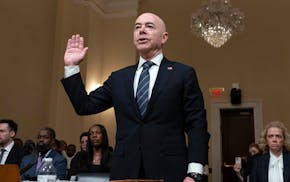Oprah she isn't, but when U.S. Rep. Betty McCollum was ready to go public Wednesday with an endorsement of presidential candidate Barack Obama, his top campaign strategists took pains to make a big deal of it.
"It's one of the most sought-after endorsements in Minnesota," Minneapolis Mayor R.T. Rybak crowed to reporters.
Every four years, the endorsement dance resumes, as pols here and across the nation name their preferred White House hopefuls.
In the end, though, it's not clear these endorsements mean all that much to voters.
The locals naturally hope to give their champions a boost, large or small. But more important may be their hope that, in the end, they will be able to say they were an early backer of the next president of the United States.
The dance is well underway again in Minnesota, with an unusually broad field of candidates attracting support from an unusually splintered group of state and local officials.
The state's two top Republicans have parted company, with Gov. Tim Pawlenty backing Arizona Sen. John McCain and Sen. Norm Coleman signing on with former New York Mayor Rudy Giuliani.
On the Democratic side, Rybak was early to jump on the bandwagon of the Illinois senator, while St. Paul Mayor Chris Coleman more recently came out for New York Sen. Hillary Clinton.
And so it has gone throughout the field, with most of the parties' front-running candidates attracting at least a handful of officials and prominent party activists.
"It's a kind of natural dispersion of endorsements that's a sign of the '08 campaign," said Larry Jacobs, director of the Center for the Study of Politics and Governance at the University of Minnesota. "It's the most wide-open competition we've had in eight decades."
House Minority Leader Marty Seifert, R-Marshall, agreed. Seifert, too, has gone his own way, as former Tennessee Sen. Fred Thompson's most prominent Minnesota supporter.
"It's reflective of the country at large, where there's no consensus of who should be the nominee -- on either side," Seifert said. "So people are all over the board. It seems like a unique time in politics."
Fundraising is the benefit
There is little evidence that endorsements have a measurable effect on voters' decisions.
In the midst of the 2000 presidential campaign, researchers at University of Pennsylvania's Annenberg Public Policy Center analyzed the effects of endorsements on primary voters and found them mixed.
"Endorsements did influence some groups of voters -- some in the direction the endorser and the candidate hoped, others in the opposite one," they concluded.
And, in the absence of news media coverage about particular endorsements or campaign ads touting them, most voters simply didn't know about them. For example, although the late Paul Wellstone backed up his endorsement for former New Jersey Sen. Bill Bradley with extensive stumping across Iowa in 2000, only one-fifth of Democratic caucus-goers even knew about the endorsement.
Still, endorsements can matter, Jacobs said. "It's more of an indirect effect that in the end helps create an environment that's pretty beneficial. The endorsement can get media attention. When [former Vice President Walter] Mondale endorsed [Sen. Hillary] Clinton, she got a bump of national media attention. The same goes for Oprah and Obama."
The other indirect lift endorsements offer candidates is that they can spur fundraising, either because the endorser adds to a candidate's credibility, or because he or she can turn to an existing network of potential check-writers, Jacobs said.
Added Rybak: "I don't think it has a lot of an effect on how people decide to vote ... But it can help fund-raise for a candidate and can open the door to help you attract volunteers if they see you out there, working in the trenches. If you're just putting your name on a piece of paper, it doesn't mean a lot."
That said, in announcing McCollum's endorsement, "as long as you're getting endorsements, I couldn't be happier than to get Betty McCollum's," Rybak said Wednesday.
Unity ahead
Even though the state's prominent elected officials have cast their endorsements widely, neither Seifert nor Rybak believes that will create an obstacle to attaining party unity once the nominees emerge from the crowd of candidates.
"It's an odd time, but at the end of the day, people always unite around the nominee," Seifert said. "I think the Republicans will get stitched back together -- the Democrats, too -- especially if someone comes out and takes off like an airplane after the early states."
"There's a lot of mutual respect in the party for all the candidates," Rybak said. "It's not that people don't like the candidates they aren't supporting at this point."
Bob von Sternberg • 612-673-7184
New Black congressional district in Louisiana bows to politics, not race, backers say
Trump trial jury selection process follows a familiar pattern with an unpredictable outcome
Climate change concerns grow, but few think Biden's climate law will help, AP-NORC poll finds
